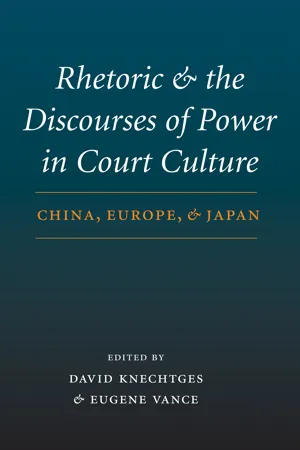
Rhetoric and the Discourses of Power in Court Culture
China, Europe, and Japan
- 365 pages
- English
- ePUB (mobile friendly)
- Available on iOS & Android
Rhetoric and the Discourses of Power in Court Culture
China, Europe, and Japan
About This Book
Key imperial and royal courts--in Han, Tang, and Song dynasty China; medieval and renaissance Europe; and Heian and Muromachi Japan--are examined in this comparative and interdisciplinary volume as loci of power and as entities that establish, influence, or counter the norms of a larger society. Contributions by twelve scholars are organized into sections on the rhetoric of persuasion, taste, communication, gender, and natural nobility. Writing from the perspectives of literature, history, and philosophy, the authors examine the use and purpose of rhetoric in their respective areas. In Rhetoric of Persuasion, we see that in both the third-century court of the last Han emperor and the fourteenth-century court of Edward II, rhetoric served to justify the deposition of a ruler and the establishment of a new regime. Rhetoric of Taste examines the court’s influence on aesthetic values in China and Japan, specifically literary tastes in ninth-century China, the melding of literary and historical texts into a sort of national history in fifteenth-century Japan, and the embrace of literati painting innovations in twelfth-century China during a time when the literati themselves were out of favor. Rhetoric of Communication considers official communications to the throne in third-century China, the importance of secret communications in Charlemagne’s court, and the implications of the use of classical Chinese in the Japanese court during the eighth and ninth centuries. Rhetoric of Gender offers the biography of a former Han emperor’s favorite consort and studies the metaphorical possibilities of Tang palace plaints. Rhetoric of Natural Nobility focuses on Dante’s efforts to confirm his nobility of soul as a poet, surmounting his non-noble ancestry, and the development of the texts that supported the political ideologies of the fifteenth-century Burgundian dukes Philip the Good and Charles the Bold.
Frequently asked questions
Information
Table of contents
- Rhetoric and the Discourses of Power in Court Culture
- Title
- Copyright
- Contents
- Acknowledgments
- Introduction by David R. Knechtges
- Part I. Rhetoric of Persuasion
- Part II. Rhetoric of Taste
- Part III. Rhetoric of Communication
- Part IV. Rhetoric of Gender
- Part V. Rhetoric of Natural Nobility
- Index